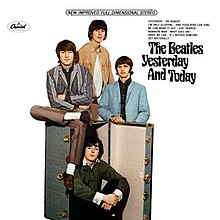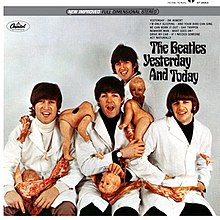Butcher cover
| Yesterday and Today | ||||
|---|---|---|---|---|
 |
||||
| Studio album by the Beatles | ||||
| Released | 20 June 1966 | |||
| Recorded | 1965–66 | |||
| Studio | EMI Studios, London | |||
| Genre | ||||
| Length | 27:33 | |||
| Label | Capitol | |||
| Producer | George Martin | |||
| The Beatles North American chronology | ||||
|
||||

The controversial original "butcher" cover
|
||||
| Professional ratings | |
|---|---|
| Review scores | |
| Source | Rating |
| AllMusic | |
| Encyclopedia of Popular Music | |
| The Rolling Stone Album Guide | |
Yesterday and Today is a studio album by the Beatles, their ninth album released on Capitol Records and eleventh overall American release. It was originally issued only in the United States and Canada. In the 1970s it was issued in Japan. A later UK release (on Compact Disc) followed in 2014. The album is remembered primarily for the controversy surrounding its original cover image, the "butcher cover" featuring the band dressed in white smocks and covered with decapitated baby dolls and pieces of meat. The album's title is based on the song "Yesterday". Early album cover proofs show the word "Yesterday" in quotes.
Both Tim Riley and American Songwriter journalist Jim Beviglia classified Yesterday and Today as a compilation album, and MusicRadar said it was one in a series of "hit-filled compilation albums" that the American Capitol label "sliced and diced" from the Beatles' original British albums.
Yesterday and Today included tracks from the Beatles' two most recent British LPs which had not yet been included on American albums, plus three from their upcoming LP in the United Kingdom, plus two songs which were back-to-back on a single:
The hodge-podge nature in which Capitol Records compiled their albums irritated the group, who felt they had "put a lot of work into the sequencing" of the British albums.
Released on 20 June 1966, the Yesterday and Today album's controversial cover (see section below) marked the first time the Beatles' judgement was criticised by the media and distributors. After advance copies were sent to disc jockeys and record reviewers, negative reaction to the cover photo was so strong Capitol recalled 750,000 copies from distributors to replace the cover. The total cost to Capitol to replace the cover and promotional materials was $250,000, wiping out their initial profit. Nevertheless, the album reached #1 on the US Billboard charts by 30 July 1966 and certified gold soon after. It stayed at number one for five weeks.
...
Wikipedia
